It’s a question that has puzzled many – can a fish drown? The answer is no. Fish cannot drown but can die of suffocation or asphyxiation.
Suffocation occurs when the fish cannot get oxygen to breathe, while asphyxiation happens when the water contains too much carbon dioxide. In either case, if the fish does not get enough oxygen, it will die.
What Is Drowning?
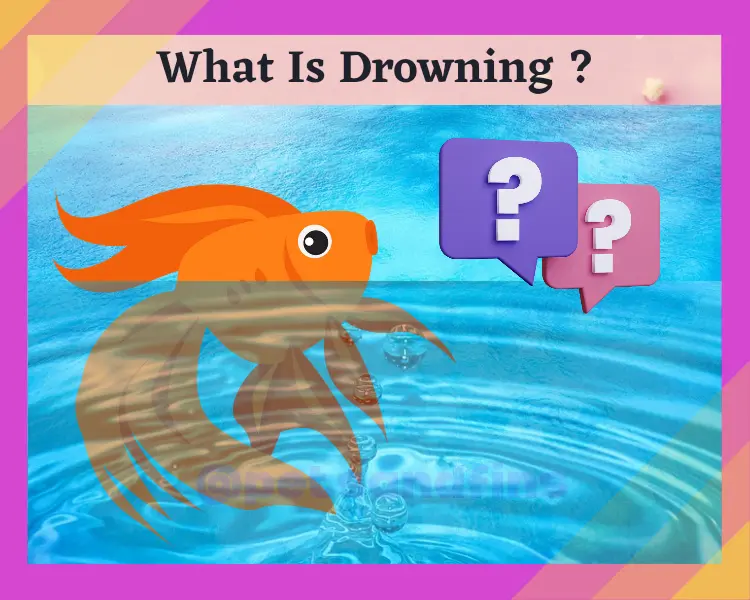
Drowning actually occurs when the lungs can’t process oxygen due to the presence excess amount of water in the lungs. It can happen very suddenly. Water interferes with the ability to exchange oxygen and carbon dioxide, leading to suffocation.
That is, the intake of oxygen gets prevented. While it is possible to let out the carbon-di-oxide already present in the lungs, it becomes impossible to breathe in oxygen. This is because beings that have lungs cannot process the oxygen present in water.
In simple terms, when lungs fill with water, it causes the stoppage of breathing and in turn suffocation.
Can A Fish Drown?
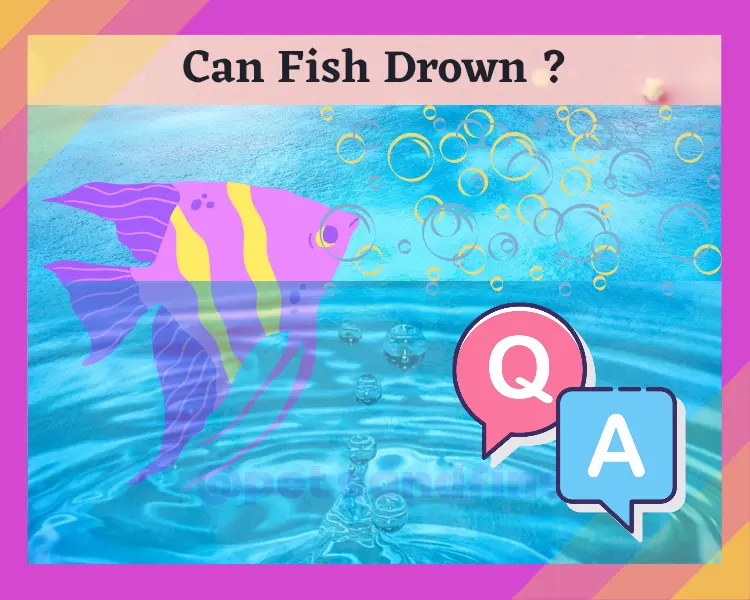
Fish are an interesting creature. Fish only die from asphyxiation or suffocation when they are unable to process oxygen. Fish have an internal organ called a swim bladder that helps them stay afloat.
When a fish is sick, it might sink to the bottom, but it will eventually float back to the top when the swim bladder fills with air again.
Fish don’t have lungs as we do, instead, they have gills. Gills are thin sheets of tissue that are full of blood vessels. The gills allow the fish to extract oxygen from the water and get rid of carbon dioxide.
They need to be constantly moving to keep the water flowing over their gills. Fish take in oxygen from the water around them and release carbon dioxide.
This process happens thanks to the gills, which are a series of thin sheets of tissue that are full of blood vessels.
The water only passes through the gills during which the blood vessels pick up oxygen from the water and release carbon dioxide back into the water.
Even though fish live in water, they don’t need water to breathe.
Instead, they need the oxygen that has dissolved in water. Essentially, fish can’t drown because they don’t inhale water. Let us look at the anatomy of the fish in relation to this.
The Anatomy Of A Fish (Gills)
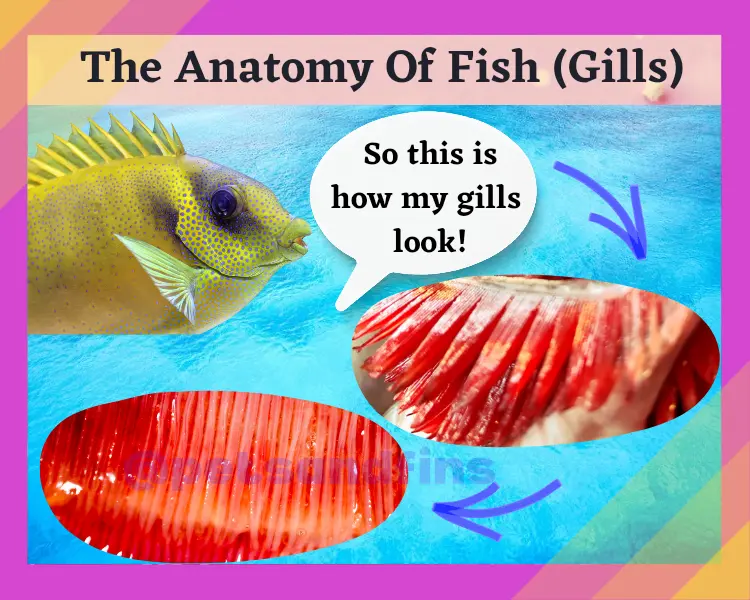
Fish are very fascinating beings. They live in water but unlike many other animals, they don’t have lungs. So, how do they breathe? They have gills made up of layers of cells that together form the epithelium.
The water moves across the epithelium and the cells absorb the oxygen dissolved in the water. This epithelium is full of blood capillaries and the oxygen is transmitted to the veins of the fish.
Once the oxygen is absorbed, carbon dioxide is released back out into the water. As the water flows through the gills, oxygen is diffused into the blood, and carbon dioxide is diffused out.
This exchange of gases continues until the fish closes its mouth and expels the water from its operculum.
Did You Know:
You might not know this, but some fish have four gills. That’s right, four gills! Now, you might be wondering how they manage to breathe with all those extra gills. Well, it’s pretty simple.
The mouth of the fish has an important role in the process of its breathing. The mouth takes in the water and sends it out through the gills.
So, essentially, the fish is using its mouth to breathe. Pretty neat!
Can A Labyrinth Fish Drown?
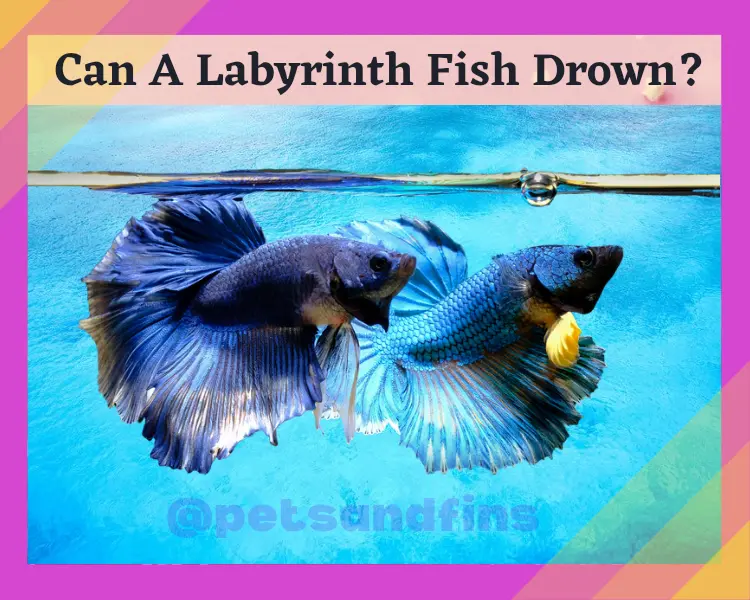
Yes, labyrinth fish can drown. Though it may seem impossible, given their natural habitat and distinctive physiology, fish can and do drown from time to time. There are two main types of fish: those that breathe air and those that don’t.
Facultative air breathers only breathe air when the water is oxygen-depleted. Obligate air breathers need to breathe atmospheric air because their gills aren’t able to extract enough oxygen from the water.
Obligate air breathers are also known as Anabantoidei or labyrinth fishes. These are a group of fish that includes popular aquarium species such as gouramis and bettas.
Labyrinth fishes can take oxygen directly from the air via their labyrinth organ. These fish have to rise to the surface periodically to take gulps of air.
That air is forced into the labyrinth organ, where the oxygen is extracted. So, if a labyrinth fish isn’t able to get to the surface for a gulp of air, it will suffocate and drown.
What Is Suffocation?
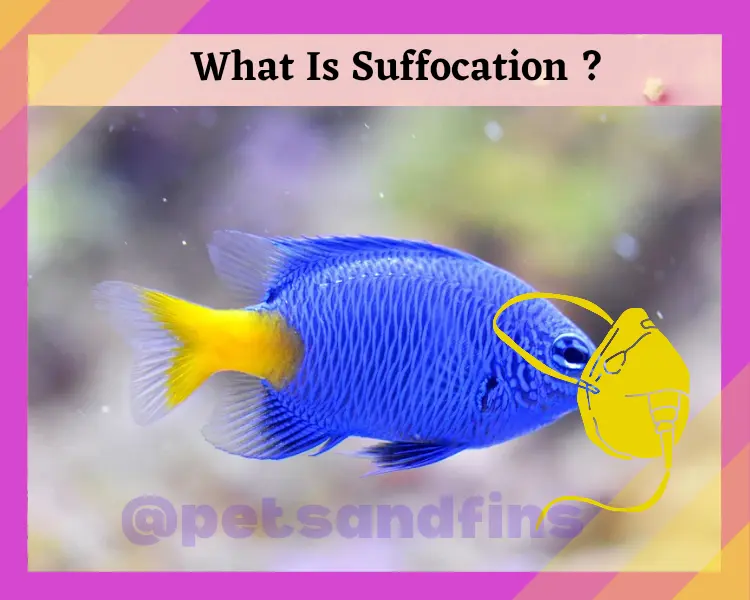
Inability to take in oxygen is known as suffocation. Fish get dissolved oxygen from the water around them through their gills. If the fish are unable to take in the oxygen, the fish will start to suffocate.
When a fish is suffocated, it means that the gills have been blocked and the fish can’t get any oxygen. This can happen in a few different ways:
1. When a fish is caught in a net, it can get squeezed so tight that the gills can’t open up to take in air.
2. If there’s too many algae or sediment in the water, it can cover up the gills and prevent them from getting any oxygen.
What Is Asphyxiation?
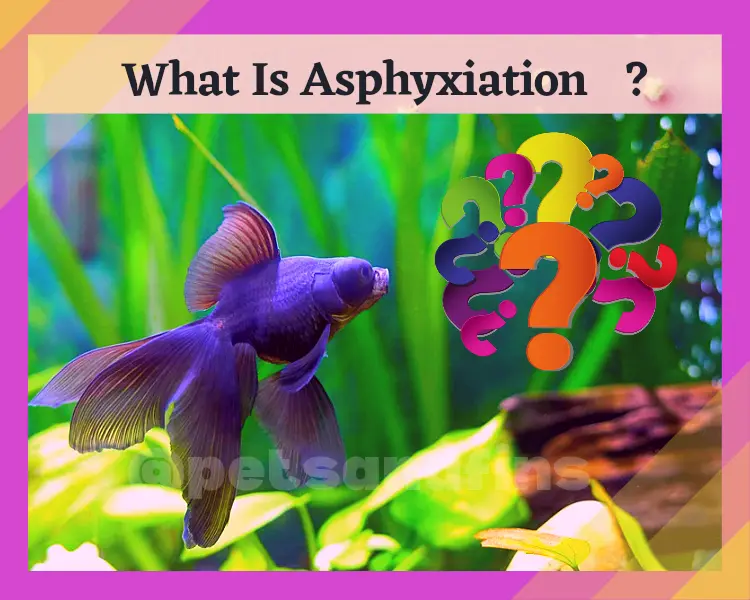
Asphyxiation happens when there’s an excess of carbon dioxide in the water and not enough oxygen. It can also be the case where there is no oxygen available.
It can also refer to a situation in which the fish are unable to breathe due to the presence of excess elements such as excess carbon dioxide in the water.
There are lots of different types of asphyxiation, but the one that affects fish is carbon dioxide poisoning. When there’s too much CO2 in the water, the fish suffocate because they can’t breathe.
This happens most often when people over-fertilize their ponds or when agricultural runoff pollutes the water. It can also happen when there’s an accidental spill of fuel or oil into a body of water.
Difference Between Suffocation & Asphyxiation
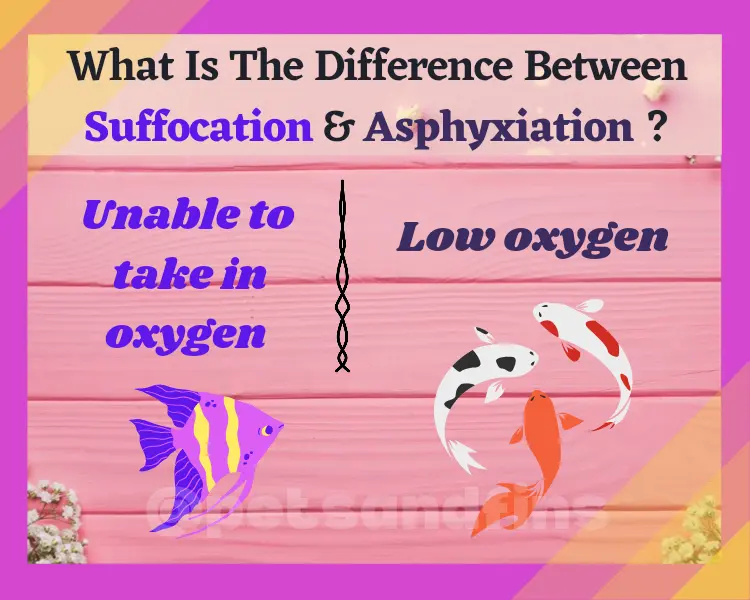
What is the difference between suffocation and asphyxiation? To many, the two words seem interchangeable. After all, they both involve depriving the body of oxygen, leading to unconsciousness and, eventually, death.
However, there is a very important distinction between the two.
Suffocation occurs when the lungs are unable to take in oxygen even though oxygen is present.
Asphyxiation, on the other hand, happens when the oxygen levels are very low, This can be due to poisoning from carbon monoxide or other toxins.
Suffocation occurs due to the ‘inability to take in’ oxygen. However, asphyxiation occurs when there is ‘low or no’ oxygen.
Reasons Why Fish Can Suffocate In Water
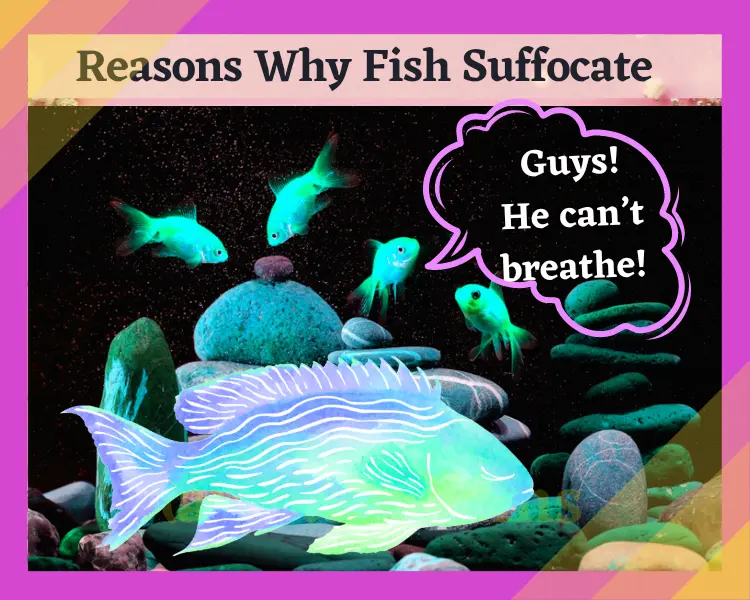
Cannot Swim Forward Or Dragged Backward:
Fish are amazing creatures. Not only do they have the ability to swim, but they can also breathe underwater! Of course, this isn’t magic; it’s just science.
You see, fish need to move forward to allow the water through their mouth and into their gills. Without this constant flow of water, the gills cannot absorb the oxygen they need to survive. As a result, fish can asphyxiate.
So the next time you see a fish swimming lazily in the tank, remember that it’s not just being lazy – it’s working hard to stay alive!
Still Water:
Flowing water is very important to fish – it’s what they’re used to and what they thrive in. Still, waters inhibit the process of breathing in fish, as a result of which fish get less oxygen and die.
That’s why you often see fish swimming around in rivers and streams – the flowing water helps them to breathe.
Damaged Gills:
There are many reasons why a fish might suffocate in water, but the most common cause is damaged gills. This can be the result of nets, water hardness, or sharp decorations in the fish’s environment.
In the wild, fish can also be suffocated by fish hooks that become lodged in their gills. No matter what the cause, damaged gills prevent a fish from getting the oxygen it needs to survive, and eventually, the fish will suffocate and die.
Unfortunately, there are several reasons why fish can suffocate.
One common reason is disease. Bacterial infections can damage the gills and lead to suffocation.
Reasons Why Fish Can Asphyxiate In Water
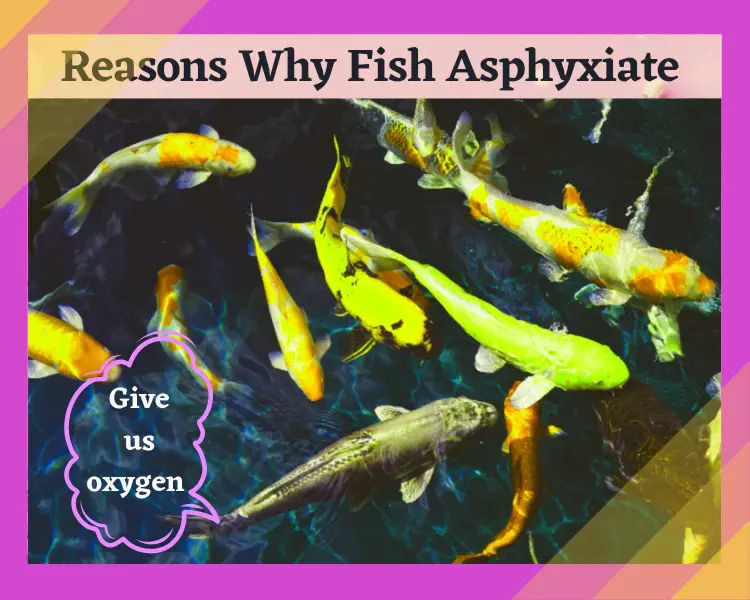
Co2 Build-up:
Fish get the oxygen they need by taking it in through their gills. But what happens when the oxygen in the water starts to run out?
Over time, if the oxygen levels in the water start to decline (due to Co2 build up), the fish will start to asphyxiate. The first signs of this are usually listlessness and lack of appetite.
As the oxygen depletion progresses, the fish will start to gasp for air at the surface of the water. Eventually, if the oxygen depletion is severe enough, the fish will die.
So what causes low oxygen levels in water? There are a few different factors that can contribute to this problem.
One is simply too many fish in a small area. When there are too many fish competing for oxygen in a small space, it can lead to a decrease in dissolved oxygen levels.
Algae:
Algae might not look like much, but it can be quite dangerous to your fish. While most algae are harmless, some types can release toxins that can harm your fish or deplete the oxygen in the water.
This can be especially harmful to baby fish or fish that are already sick. To prevent algae from taking over your fish tank, it’s important to keep the tank clean and remove any algae that do start to grow.
Less Surface Area:
As any fish keeper knows, a fish tank is a delicate ecosystem. Not only do the fish need oxygen to breathe, but they also produce waste that can quickly pollute the water.
As a result, it is important to maintain a proper balance of surface area to volume to ensure that the fish have enough oxygen and that the water stays clean.
Unfortunately, this can be a challenge when dealing with a small tank.
When the surface area is limited, the oxygen in the water gets depleted more quickly, and the fish can suffocate. In addition, it is more difficult to keep the water clean in a small tank, as waste builds up more quickly.
Overcrowding:
Oxygen is essential for healthy fish. It is so important that if the levels in a tank get too low, the fish can suffocate and die. One of the main reasons that oxygen levels can drop in a tank is overcrowding.
When there are too many fish in a small space, the oxygen gets depleted quickly. As a result, it’s important to make sure that your tank isn’t too crowded.
Not only will this help to keep your fish healthy, but it will also prevent them from asphyxiating.
High Temperature:
Increasing water temperature can have several deleterious effects on fish, including depletion of oxygen molecules in the water. When this happens, the fish can die.
In addition to causing oxygen depletion, warmer water can also lead to increases in the growth of algae and aquatic plants.
This can decrease the amount of dissolved oxygen in the water, as well as increase the levels of toxins and pollutants.
Warmer water can also disturb the delicate balance between predator and prey species, leading to a decrease in biodiversity.
As a result, it is important to be aware of the potential dangers of increasing water temperature.
Chemical changes:
If you’ve ever kept fish as pets, you know that they require a delicate balance of oxygen, ammonia, and nitrates in their tank. If the oxygen levels drop too low or the ammonia and nitrates rise too high, it can be fatal for your fish.
This build-up is often caused by overfeeding, which can create too much waste in the tank and lead to poor water quality.
It’s important to perform regular water changes to remove this waste and keep your fish healthy.
Water Hardness:
Have you ever wondered why your fish always seem to be gasping for air? It’s not because they’re smoking cigarettes (although that would be pretty cool to see).
Hard water is water that has high levels of minerals, such as calcium and magnesium. These minerals can cause a variety of problems for fish, including reduced oxygen levels in the tank.
If the tank is overcrowded, this can lead to a worse situation where the fish asphyxiate. So if you’re noticing that your fish are always gasping for air, it might be time to get your water tested.
If you have hard water, don’t worry – there are ways to treat it so that your fish can live a long and healthy life.
Wrapping Up:
Have you ever wondered whether fish can drown? Well, the answer is a little bit complicated. Fish cannot drown in the traditional sense of the word, but they can suffocate or asphyxiate.
Some fish have a labyrinth organ, which allows them to take in oxygen directly from the air.
These fish can drown if they are unable to reach the surface to breathe. There are several reasons why fish might suffocate or asphyxiate. Knowing all this will help you keep your fish safe and happy.
Which part surprised you the most? Do let us know. If you have any questions please do feel free to ask and our team will be happy to help.


